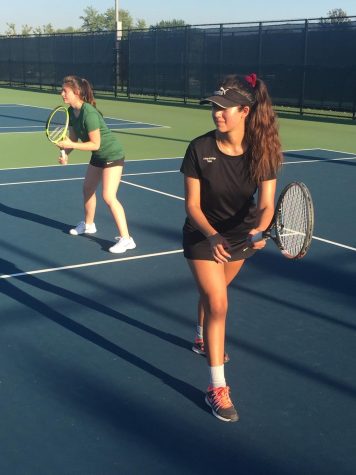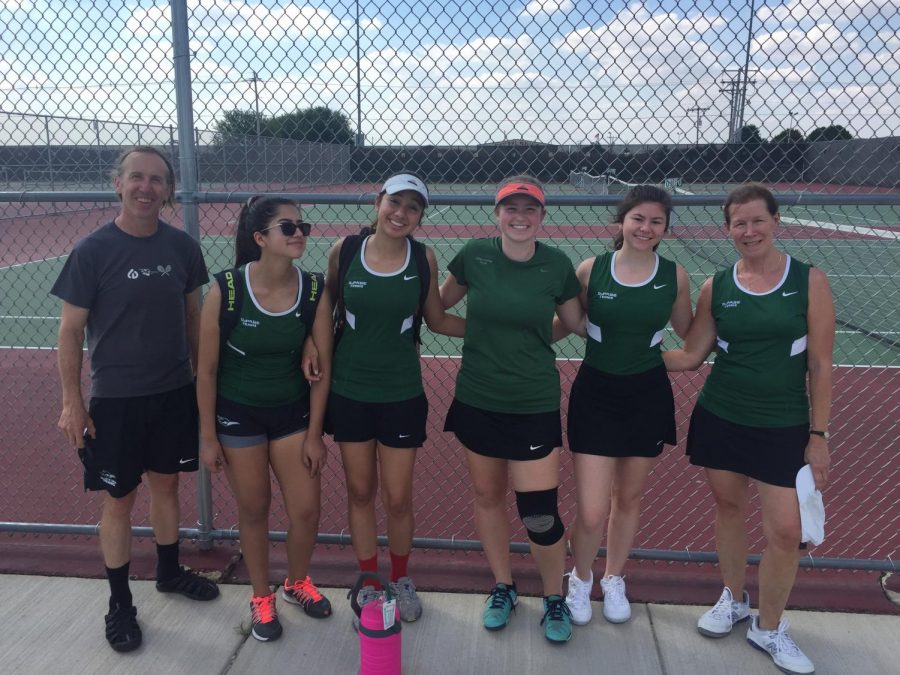There is No Service Without Honor; COD Tennis and Repercussions of Athletic Probation
From left to right: Coach Jim Bowers; Lucero Bustamante; Pahola Soriano; Rachel Hofstetter; Tamara Kruic; and Julie Benes
September 18, 2018
COD Tennis strives to embody an upstanding community of mutual support amongst players and staff, but also a competitive spirit with no shortage of player tenacity and perseverance. However, in light of the recent athletic probation, one of the teams’ greatest aspirations will remain unattainable for this year.
The Tennis Team has recently returned to a non-scholarship division, meaning dropping down to the Division III level, and likely facing easier opponents. However, for the last eight years, COD Tennis has compete at the Division I level to great success.
Out of the last eight years of competition the tennis team qualified to compete at the NJCAA National Tournament with the men’s and women’s teams three times each respectively.
This is despite the fact that at the Division I level, non-scholarship athletes playing for COD would have been facing off against players from other schools that did have scholarship to compete at their institutions.
COD manages to do this while being a comparatively conducive environment to athletes with an interest in tennis but also outside time constraints. When compared to scholarship institutions, COD compromises with student availability, as opposed to non-negotiable match times.
Even while attaining competitive achievement, although the starting lineup is based on merit, the tennis team remains an encompassing organization for anyone who wants to learn the game. There are no cuts from the team.
All of these factors in combination should have placed Division I scholarship institutions at a natural advantage against COD’s Tennis Team. Nonetheless, they remained competitive.
Head Tennis Coach, James Bowers, who has a decorated collegiate background in his own right, cites more than just the virtues of the tennis team as a means for their consistent success.
“Reason we are able to be competitive in the region, state, and national tournament is our wonderful facilities and our great support systems,” he said. “Like our trainers, if we had health issues with our players, in any sports, they have a lot people that they can call. If any of the players are having problems with their academics, once again, we have a great support staff. We have a competitive schedule, we play the best in the state of all the junior colleges, and we have a chance to go to the national tournament. There’s no cost to be on team, there’s an opportunity to go on this school-sponsored trip, and go play tennis every week.”
Through these means, the tennis team as an organization helps foster an environment where players are encouraged to have a more balanced lifestyle. That has translated to on court success.
The game itself also helps contribute to a balanced state of being, and therein becomes more than just a game for many collegiate athletes.
“In tennis, and all sports, it can be a lifelong activity,” Bowers said. “There are many benefits in doing something sports related or fitness related. It keeps your body in shape and your mind alert. In all sports there’s social aspects too. One of the dangers of community college is that you might want to commute there and go home. Going in, playing sports, lets you meet different people. It forces you out of your comfort zone.”

These standards of competition are not only upheld by the more tenured student athletes, but also incoming freshman who become part of the team. Louis Hara is a freshman and a men’s tennis recruit for the spring season. A natural love of tennis motivates his dedication to the game, but it’s facing off against the opposing player on the opposite side of the court that keeps his passion burning. “The competition and going to regionals. Going against stronger guys is really fun. The team spirit was really fun as well.”
With a competitive nature and team comradery so powerfully perpetuated throughout the program, it only exasperates the disappointment of being barred from this season’s regional qualifier and, consequently, national tournament.
COD hosts the regional qualifying tournament for its tennis division annually. Under ordinary circumstances, COD athletes would compete in the tournament this year on Oct 13. With a chance to qualify for nationals taking place in Peach Tree, Ga. on Nov 1.
However, with the recent athletic probation sanctioned by the NJCAA, COD has offered to host Elgin and Illinois Valley for the event as usual, but COD athletes will not be eligible to participate.
This probation was sanctioned due to student-athlete information processing oversights committed by members of the athletic department since 2013. This rendered those athletes, potentially unbenounced to them or other members of the athletic department, ineligible to play. However, those athletes were still fielded in their respective sports.
After conducting an internal audit and discovering these errors, COD self report their findings. The NJCAA then ruled a year long athletic probation preventing any teams from participating in postseason events. Unfortunately, players, whether involved or uninvolved, bare the burden of consequence for the institution’s mistakes. Not only will players miss out on the competitive experience, but they will also miss out on the opportunity to qualify for the national tournament.
The circumstances are especially unfortunate for players like Lucero Bustamante, who not only looked towards the tournament with anticipation, but are also in their sophomore year at COD. Bustamante has aspirations to transfer to a four-year institution following this year, but she does not expect to continue playing tennis once attending. The regional tournament may have represented her final opportunity to experience upper-level competition and contend for an opportunity to qualify for nationals.
Bowers has recognized the implications of the athletic probation on his players. “Last year, those two sophomores, they had the opportunity to play the regionals, and to compete, and to potentially qualify for the nationals, and they really enjoyed that,” he said. “That chance, to have the dream of qualifying for the nationals, that’s why they kind of practice throughout the year and during the off season. Sure they were looking forward to that. I was looking forward to that, like every student athlete here.”
The limitations of this year’s season have not dissuaded the women’s tennis team. They all have opted into competing during their regular season despite the lack of postseason potential.
As a means to make up for the loss of tournament participation, Bowers and COD Tennis hopes to schedule additional matches versus the likes of Elmhurst, Northwestern and Roosevelt College to supply more of a competitive experience to their players.
The effort to supply players with additional matches is not understated, but neither can be the fact that there will be be an irreplaceable aspect to this season’s competition.
Louis Hara knows first hand what the uniqueness of that experience is like. “I was able to go to regionals, and it was a very good experience in getting to play against stronger teams. Winning with your team is amazing because your teammates support you while you’re out. Against strong opponents, when you win, it’s even better because you feel confident and satisfied. COD not doing that, it kind of ruins the point.”


















